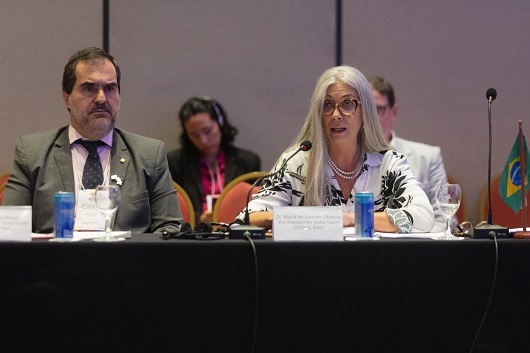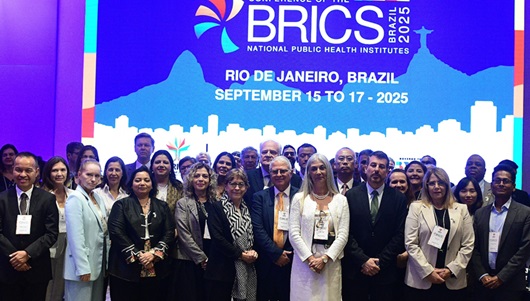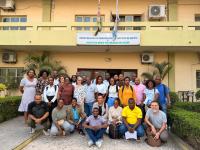Network of National Public Health Institutes of the Brics is Created at Conference
One of the main legacies of the 1st Conference of the National Public Health Institutes (NPHIs) of the Brics, organized by Fiocruz in partnership with Brazil’s Ministry of Health, is the creation of a permanent Network of the NPHIs of the bloc. This initiative aims to ensure continuity of the dialogues initiated this week during the event. The objective is to establish working groups and new partnerships to strengthen the health systems of the member countries, including Brazil. The creation of the Network is among the several commitments agreed upon by the NPHIs, which will also be included in the Conference Declaration. This document was negotiated and finalized during the event and will be released soon.
The proposal for the Network was welcomed by the representative of India — the country that will assume the Brics presidency next year — Rajan Das, on the final day of the event, held from September 15 to 17 in Rio de Janeiro. Representatives of the NPHIs from Brics countries and partners, as well as diplomatic representatives, members of the United Nations, the Federal Government, and Fiocruz, discussed technical and scientific cooperation to strengthen public health systems. Through panels on strategic topics — such as surveillance and emergency response, climate change and health, and the fight against hunger and poverty — participants identified common commitments, including the creation of the Network, and made recommendations to their governments.
Fiocruz Vice President for Global Health and International Relations, Lourdes Oliveira, emphasized the value of the dialogues established during the meeting, which she believes will shape the trajectory of public health cooperation among these countries. “Our discussions reaffirmed the central role of NPHIs in building resilient health systems, capable of protecting our populations from health crises, climate change, social inequities, and many other challenges,” she said. “Beyond declarations, we recognize the need for concrete results. In this spirit, Fiocruz, together with the Ministry of Health, announces the creation of the Brics Network of National Public Health Institutes and reinforces its role as a strategic mechanism to expand cooperation among us, including the establishment of working groups that will allow us to turn our aspirations into practical and coordinated actions.”

In welcoming the creation of the Network, the representative of the Ministry of Health and the Special Advisory Office for International Affairs (Aisa), Guilherme Cyrne, stated that the conference is “a demonstration of the commitment of Brics countries to the bloc’s main objective: building a more inclusive and representative international order.”
The Director of Collaborative Surveillance, Workforce, and Health Emergencies at the International Association of National Public Health Institutes (Ianphi), Sadaf Lynes, also emphasized the commitment of those present to effective collaboration. “I believe there is a great opportunity with the creation of the Network to truly advance discussions and ensure we have a real impact not only in our countries but also in the regions we represent here,” she observed.
Finally, a dialogue with the Director of India’s NCDC, Rajan Das, sealed the creation of the Network as a legacy and continuity of the conference. In his presentation, he highlighted India’s health priorities during its upcoming Brics presidency, such as strengthening production capacities and workforce development. He also pointed to potential areas of cooperation within the bloc, including traditional medicine and knowledge, as well as food security.
“We seek not only solidarity, but also the sharing of strengths, learning from the experiences and partnerships we are building within the Brics,” he said. Rajan Das committed to continuing the work of the Network in 2026, when the initiative’s first meeting will take place.

Strengthening relations
At the close of the three-day meeting, Fiocruz Presidential Advisor for International Affairs and General Rapporteur of the Conference, João Miguel Estephanio, noted that it was possible to build effective relationships among Brics representatives. “We became friends, we strengthened our ties. I believe that in this way we will be able to move forward with our goals and bring real benefits to our populations,” he concluded.
The expectation is that the discussions initiated this week will serve only as a starting point for further joint work among the bloc’s countries and their partners, with Fiocruz acting as a facilitator. “Fiocruz keeps its doors open to welcome you in the future. Our home is your home,” concluded Vice President Lourdes Oliveira.
As an additional outcome of the conference, a digital platform will be created to provide access to the presentations and final documents, including the NPHI Conference Declaration.



